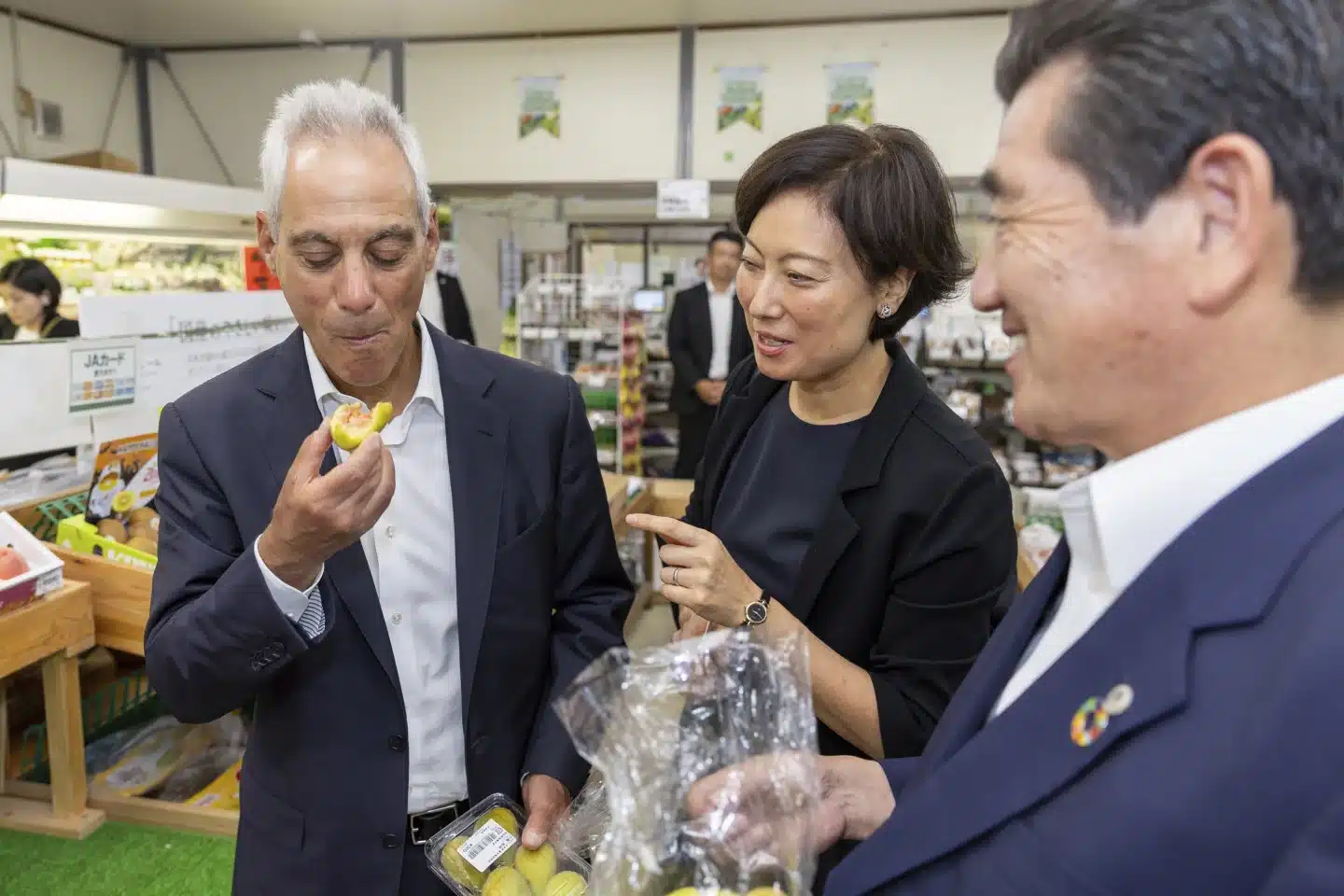TOKYO, Japan – On Thursday, the US ambassador to Japan visited Fukushima city and had a seafood lunch with the mayor, spoke with fishermen, and stocked up on local produce to demonstrate that they are safe following the release of treated radioactive wastewater from the wrecked Fukushima nuclear plant into the sea, expressing support for Japan while criticizing China’s ban on Japanese seafood as political.
Ambassador Rahm Emanuel ate sushi of flounder and sea bass with Soma Mayor Hidekiyo Tachiya, spoke with local fisherman, and went to a grocery store where he sampled fruits and purchased peaches, figs, grapes, flounder, sea bass, and other Fukushima prefecture produce.
Emanuel remarked over the phone from his train back to Tokyo that his purchases would be served when his children visit him this weekend. “We’re all going to eat it.” As a father, I would not serve if there was a problem.”
The cleaned wastewater was released last week and is anticipated to persist for decades. Japanese fishing groups and neighboring countries oppose it, and China has promptly banned all imports of Japanese seafood.
Emanuel lauded Japan’s water release plan as scientifically sound and transparent, stating that it “stands in total contrast” to how China handled the coronavirus pandemic.
On Thursday, the US ambassador to Japan visited Fukushima city and had a seafood lunch with the mayor.
“The Chinese ban is purely political,” he explained. The lifting of the restriction “depends on whether China wants to be a good neighbour,” according to Emanuel.
Since a severe earthquake and tsunami in 2011, which devastated cooling systems and triggered meltdowns in three reactors, radioactive wastewater has been collected at the Fukushima plant. The 1.34 million tonnes of water is held in approximately 1,000 tanks and is growing due to leaks and the use of cooling water.
According to the government and the plant’s operator, dumping the water into the sea is unavoidable because the storage tanks will reach capacity early next year, and space at the plant would be required for the plant’s decommissioning, which is estimated to take decades.
Earlier Thursday, Japanese Prime Minister Fumio Kishida sampled seafood and spoke with workers at Tokyo’s Toyosu fish market to examine the impact of China’s seafood embargo.
One of the seafood business owners told Kishida that his scallop sales, mostly sent to China, have decreased by 90% since the wastewater discharge began.
Kishida told reporters that he had directed officials to put up assistance measures for seafood exporters affected by China’s import ban, including increased domestic demand and new destinations for Japanese seafood to replace China.
“We will patiently and resolutely call on China to take actions based on scientific evidence,” Kishida said.
On Thursday, the US ambassador to Japan visited Fukushima city and had a seafood lunch with the mayor.
The government has set aside 80 billion yen ($550 million) to help fisheries and seafood processing and to prevent potential damage to Japanese products’ reputation. Kishida stated that the government will do all possible to defend the fisheries industry, including using the fund and other financial measures.
Even before the wastewater spill and the Chinese import restriction, China increased the testing of Japanese fisheries products, causing lengthy delays at customs. According to Japanese Fisheries Agency officials, the action has influenced the prices and sales of fish from as far away as Hokkaido.
According to regulators and the plant operator, Tokyo Electric Power Company Holdings, all seawater and fish sampling results have been far below set radioactive safety standards since the release.
South Korean President Yoon Suk Yeol visited a fish market and had seafood for lunch on Thursday as part of efforts to assuage public concerns about the safety of local fishery products following Japan’s wastewater release, as his country strengthens a trilateral strategic partnership with Japan and the US in the face of a growing Chinese regional threat.
On Wednesday, Chief Cabinet Secretary Hirokazu Matsuno hinted at pushing the case to the World Trade Organisation, but Foreign Minister Yoshimasa Hayashi emphasized the necessity of negotiation.
The Chinese prohibition on Japanese seafood has had an impact on tourism. According to Transport and Tourism Minister Tetsuo Saito, cancellations of Chinese group tours and questions about food safety in Japan have increased.
Meanwhile, Kishida directed Agriculture, Forestry, and Fisheries Minister Tetsuro Nomura to apologize for referring to the cleaned radioactive water as “contaminated,” as China does.
Nomura used the phrase after meeting with Kishida and other ministers to discuss fisheries support measures. He apologized and apologized for the statement, which Kishida described as “extremely regrettable.”
SOURCE – (AP)









